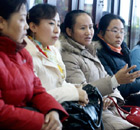Hot on the Web
Real-name system widely used to govern internet and mobile phone
(chinadaily.com.cn)
Updated: 2009-12-31 09:35
 |
Large Medium Small |
There has been heated debate about China's regulation of its internet, especially after suggestions that China may adopt a real-name system, demanding each netizen to provide real name and identity card number before using online chat rooms.
Actually, China is not the first country to mull such a mechanism. Its neighbor South Korea started to take such kind of measures several years ago.
In 2002, the South Korean government began to promote the use of real names on the Internet, and formally launched a real-name system in October, 2005, becoming the first country in the world to apply such a system.
| ||||
Website service providers can only grant their requests after confirming the authenticity of the information provided. Netizens who have passed the online identity check are allowed to use code instead of real name to leave a message to protect their privacies.
Uncivilized postings such as abuses and personal attacks in some major Internet forums decreased by more than 50 percent after the adoption of the policy, surveys conducted by S. Korean Ministry of Information and Telecommunication revealed.
The South Korean government and major websites in the country also adopted policies to block porn videos.
The Information and Telecommunication Ministry has set up a 24-hour informant center to detect illegal information on the websites. The police department has established a "website police department" to tackle reports on website-based illegal activities.
Besides the Internet real-name system, mobile phone real-name system is also implemented in some countries like Germany, Switzerland, Austria, Japan and Singapore.
According to the Telecommunication Law in Germany, potential mobile phone users have to provide their identification information before purchasing SIM cards. If the card is transferred to another person, the new user must provide his/her information too.
Switzerland parliament passed a similar law in 2003 to require people, including visitors, to provide ID cards and passports to buy a SIM card for their cellphone
In Austria, locals have to show ID cards and addresses to buy SIM cards, but visitors do not have to, however at a much higher price.
Japan realized the problem of mobile phone crime as early as 2000, and begun to tackle the problems with a joint monitoring system by several service providers, including NTTDoCoMo, J-Phone, IDO, DDICellular and Tu-KaCellular.
According to the system, every customer who buys new mobile phone numbers through the Net must supply his/her real personal information. The service providers will send a staff to the registered address to check the authenticity of the name and other information. Only after the information is confirmed can the user complete the deal.
Singapore enforced mobile phone identity registration starting from November 2005 when all mobile sellers and service providers were equipped with the Identity Scan Recognition System. Customers must put their identity card through the system before registering for new number.
It is hard to deny that the real-name system will force internet users to abide by basic ethic standards and conform to laws, making it easier to protect vulnerable citizens from unwanted hurts. With the real-name policy, criminals will think twice before uploading unhealthy, illegal contents to the Internet because they will be tracked easily.
The real-name mobile phone SIM card system can also reduce the social security risks caused by the development of the communications industry and to contain illegal activities via short messages.
Now, as other pioneering countries, Chinese government plans to launch its own step to regulate the mobile communication market aiming to protect the ordinary cell phone user from spam messages, prevent the pornographic material from harming the minor and teenagers and also the rampant fraud crime via the cell phone.













